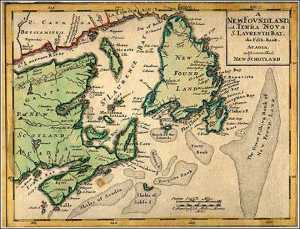Religious Influences
 Yankees in Nova Scotia turned to religious rather than political figures in their search for guidance on the many distressing problems produced by the war (Stewart &
Rawlyk 79). Born and raised in Rhode Island, Alline belonged to the Congregational church( Francis, Joseph, Smith 185). In 1776, at the age of 28, Alline began his career as an itinerant preacher and rode from town to town bringing
religion to rural communities (Ibid 185).
The once divided settlements of Nova Scotia were slowly becoming unified as a result of Alline's preaching. Religion became the prime topic of each town. Alline became so popular within the towns, that people began to forsake their own ministers, in order to hear Alline
preach! A document written by one of the members of the church in
Yarmouth in 1764, illustrates this point further,
Yankees in Nova Scotia turned to religious rather than political figures in their search for guidance on the many distressing problems produced by the war (Stewart &
Rawlyk 79). Born and raised in Rhode Island, Alline belonged to the Congregational church( Francis, Joseph, Smith 185). In 1776, at the age of 28, Alline began his career as an itinerant preacher and rode from town to town bringing
religion to rural communities (Ibid 185).
The once divided settlements of Nova Scotia were slowly becoming unified as a result of Alline's preaching. Religion became the prime topic of each town. Alline became so popular within the towns, that people began to forsake their own ministers, in order to hear Alline
preach! A document written by one of the members of the church in
Yarmouth in 1764, illustrates this point further,
"...And the religious influence that accompanied his preaching in different places, was said to be very great; and by some, was called a great Reformation! It was so represented concerning Argyle and Liverpool, the latter of which towns so generally embraced Mr. Alline's preaching, that they forsook their own Minister, Rev. Mr. Israel Cheever."(qtd. in Stewart p122) The document goes on to say that:
"...The sound of Mr. Alline's wonderful reformation at Liverpool and Argyle, and other places, quickly reached Yarmouth, and excited warm attention among Mr. Scott's people, and fully determined their minds not to neglect a second opportunity for having the benefit of Mr. Alline's preaching among them."(qtd in Stewart p123). This document recorded the eye-witnessed events at Yarmouth giving us an immeasurably clear picture of how much of an influence Alline had on the people. In another report we read,
"...he preached much in the night as well as in the day time. And a considerable number were religiously impressed and became very zealous and fervent. With much zeal and confidence, they asserted that he was sent of God, and that his works were a full proof and evidence of it."(qtd. in Stewart p140)
